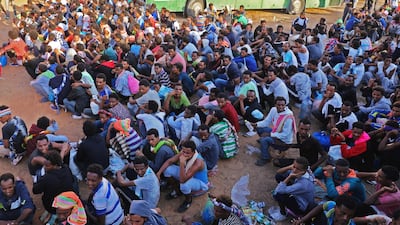The overwhelming majority of women and older girls who passed through Libya as migrants reported being gang-raped by traffickers or witnessing others taken away to be abused, the United Nations said in a report on Thursday.
But gang rape is just one of many "unimaginable horrors" migrants are being subjected to as they pass through the largely lawless country in hopes of reaching Europe, according to the report by the Office of the High Commissioner for Human Rights and the UN Support Mission in Libya.
The report covers the period from January 2017 to August 2018 and was based on interviews with 1,300 migrants in Libya, Italy and Nigeria. The investigators heard first-hand accounts of "a terrible litany of violations and abuses committed by a range of state officials, armed groups, smugglers and traffickers against migrants and refugees".
These include murder, torture, arbitrary detention, gang rape, slavery, forced labor and extortion.
The situation in Libya, where rival governments in the east and west are vying for power and militias formed during the 2011 uprising against Muammar Qaddafi hold sway in many areas, leaves migrants and refugees "at the mercy of countless predators who view them as commodities to be exploited and extorted", the report says.
The report comes as European Union leaders pursue efforts to beef up the bloc's external borders to stop large numbers of migrants from entering Europe. The Libyan coast guard, funded and supported by European nations, intercept many migrants trying to cross the Mediterranean and returns them to Libya, where they are put in detention centres.
Approximately 29,000 migrants were brought back to Libya by its coast guard since early 2017 and were transferred to immigration centres run by the Department of Combating Illegal Migration, the report said.
Many migrants were held in unofficial and illegal centres run directly by armed groups or criminal gangs. They are frequently sold from one criminal group to another and ransom extorted from their families, the report said.
______________
Read more:
Migrant rescue ship Aquarius ends mission after obstruction
Militia forces Libya’s NOC to declare force majeure on biggest oilfield
______________
The report suggests that "some state actors, including local officials, members of armed groups formally integrated into state institutions, and representatives of the ministry of interior and ministry of defence" are complicit in the trafficking of migrants.
The UN High Commissioner for Human Rights, Michelle Bachelet, said the situation was "utterly dreadful".
"Tackling the rampant impunity would not only end the suffering of tens of thousands of migrant and refugee women, men and children seeking a better life, but also undercut the parallel illicit economy built on the abuse of these people and help establish the rule of law and national institutions," she said.
"There is a local and international failure to handle this hidden human calamity that continues to take place in Libya," said the UN Special envoy to Libya, Ghassan Salame.

